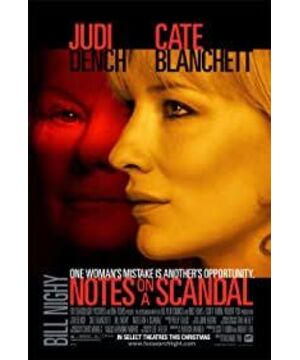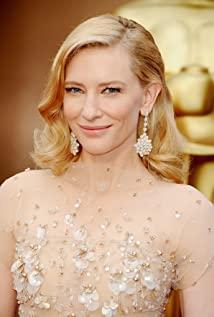The earliest I learned about this movie was that Starlight said on the page that Cate Blanchett was going to release a new film, which looked good; then I saw a black and red poster in the movie theater. So I found it The trailer, found not only Cate, but also the old showman Dame Judi Dench (the same level as Sir Ian McKellen), and the trailer looks full of conflict and confrontation, these two women's rivalry must be good.
A little idle during Christmas , I borrowed a novel from the library, and I first learned about the plot (although I can guess from the trailer), and found that a few lines in the trailer were quite misleading. It was against the harmonious atmosphere of the festival, so I dragged it off until yesterday to watch this long-awaited and nominated film. There were a lot of people queuing up at the cinema, most of them watching Dreamgirls, but Notes on a Scandal such a Drama attendance rate Exceeded my expectations, and even a gray-haired old couple came to see it together.
Let’s cut down on the nonsense. The plot is very simple. Bathsheba Hart (Cate Blanchett), a forty-two-year-old high school teacher with a husband and children, has sex with a fifteen-year-old student who is caught by an old teacher, Barbara Covett ( Judi Dench) found. Barbara did not report to the school, but kept this secret to consolidate the "friendship" with Sheba. Finally, Sheba did not accompany Barbara, who was comforting the death of her cat, but accompanied her family to watch the son with Down syndrome. After the school play, Barbara "inadvertently" revealed to a male colleague who had come to her with a crush on Sheba to find out about Sheba "like young men, very young, actually boys", and named the student. The next situation can be imagined, the boy's parents came to the door; Sheba was detained and then released on bail; Barbara was asked to retire early by the school; By chance, Sheba found the note that Barbara threw away in the wastebasket, and then found Barbara's diary/notes. It turned out that Barbara had been deliberately approaching Sheba from the first day to gain her trust, but in the end she betrayed her. She. She saw that Sheba's spirit here was greatly affected, and she broke out completely. After the outbreak, Sheba returned to calm and pushed open the door of the house. At the end of the film, Sheba walked out of the courtroom with the help of her husband after the sentence was pronounced in the newspaper, while Barbara Found her next target - a young woman reading a newspaper.
The tension of the film sometimes develops to the point of actually writhing in her seat, looking forward and fearing the next scene.
Judi Dench and Cate Blanchett's acting skills have nothing to say, Dench's role is a kind of emotional restraint, all emotions are expressed through subtle changes in expressions, gaze and tone. A self-awareness and control An old lady with strong desire. Blanchett's role has a lot of room to play, nervousness and secret anticipation at the beginning, satisfaction and joy after cheating, panic and guilt after being discovered, boredom and emptiness after the matter is completely exposed, The hysterical eruption after she found herself betrayed, her eyes are sometimes strong, sometimes blurred and sometimes confused, which perfectly shows Sheba.
The soundtrack of the film is also good, the gloomy and intense tone matches the atmosphere of the film well, especially Sheba rides The part where the car dashes down the street.
The movie, like the novel, is Barbara's first-person narration of Sheba's story, as the movie poster reveals, with Sheba in the light and Barbara in the dark. But the film's adaptation clearly paints the whole thing a rosy tint, making Sheba's The behavior seems to be "reasonable", her derailment is because her relationship has been wiped out by twenty years of marriage, taking care of her much older husband, a rebellious adolescent daughter and a mentally handicapped son, her husband has taken her existence for granted, Her mother never looked down on her, until one day a fifteen-year-old boy made her taste the taste of being pursued again; even when she had a tryst with her little boyfriend, she still remembered that she was a mother and did not allow her little boyfriend to touch her A wizard hat made for his son, even if it hurts the little boyfriend's feelings; the finale also implies that Sheba is completely free from Barbara's control and reunites with her husband. The plot in the novel is much uglier, and Sheba still feels a little guilty at first Then, due to her husband's ignorance, she gradually developed a mentality of revenge and became more involved in the affair; until the incident was exposed, she still hid the photos taken with the boy at the bottom of the handbag, some of which were topless or even more exposed. photo of her; the clay that Barbara bought to calm her down was shaped by her into a "mother and son", but the "son" under closer inspection was not her son Ben, but the boy who cheated on her. The boy also got In order to beautify, although he began to pretend that the family had no culture to attract teachers (this is consistent with the novel), and was later discovered by Barbara, he behaved incompetently, but in the movie his "feelings" for Sheba did not change, even when things were exposed. Barbara was then followed as if to take revenge; the novel's dysfunctional relationship had become increasingly one-sided by Sheba himself as the boy's increasingly tired evasion a few months before it was revealed. After the incident, the boy When chased by reporters, she just said "I fancied her, didn't I?" without showing any emotional factor, which was also forgiven by Sheba, "He doesn't know what he's talking about, he doesn't know this will cause damage."
The daughter Polly in the novel is not a girl who suffers the most puberty troubles in the movie and is completely determined by her boyfriend, but a bad girl who was expelled from school for bullying a lower grade student and was expelled by her parents for taking soft drugs, a mother and daughter. There is even a serious confrontation, the daughter's growing up reminds Sheba that she is no longer young.
To beautify Sheba inevitably ugliness Barbara. At the beginning of the film, Barbara's neatly chronologically arranged stack of notes/diary It completely changed the nature of the matter: the notes in the novel were a review of the events that Barbara wrote after the incident when Sheba was released on bail pending trial. The result of deliberate deliberation. Although Barbara in the novel has a strong desire to control Sheba, it does not involve sex. In the movie, Barbara's eyes linger on Sheba's exposed body many times, and she carefully saves Sheba's scattered hair. Sexual The meaning is greatly enhanced; especially at the end of the film Barbara quietly meets the next young woman on the bench she once sat with, giving a strong sense of hunter looking for prey, and Sheba is nothing but her long list One of them. Even the fuse that triggered the final incident--Sheba didn't stay to comfort Barbara at her request--was not about being in the show for her son, or being a good mother, as in the movie, but was eager to make peace with her little one. Lover's rendezvous, this change greatly increases Sheba's moral score, making it seem that Barbara is vexatious. Sheba in the novel is not a bad person, just...irresponsible, and can't even take care of himself.
The adaptation makes the plot and characters to some extent It's become vulgar and stereotyped, but easily accepted by more people. However, no matter what the changes are, Judi Dench and Cate Blanchett's performance is impeccable. Cate fans, Notes on a Scandal must not be missed.
View more about Notes on a Scandal reviews











